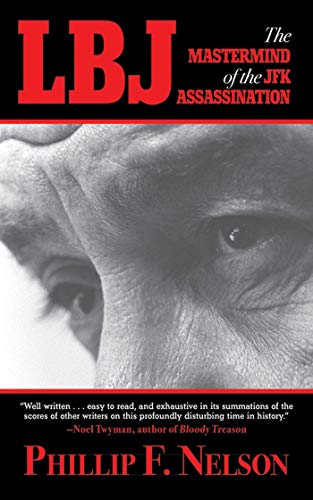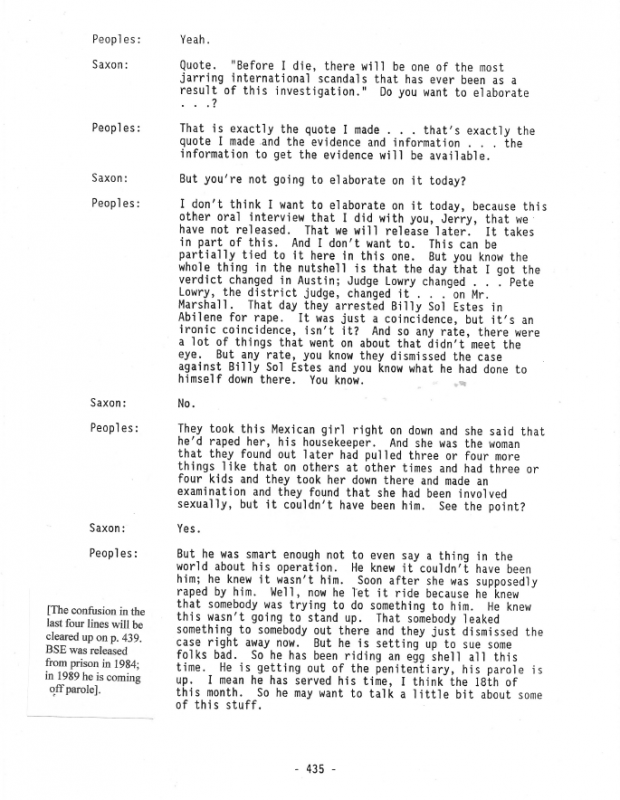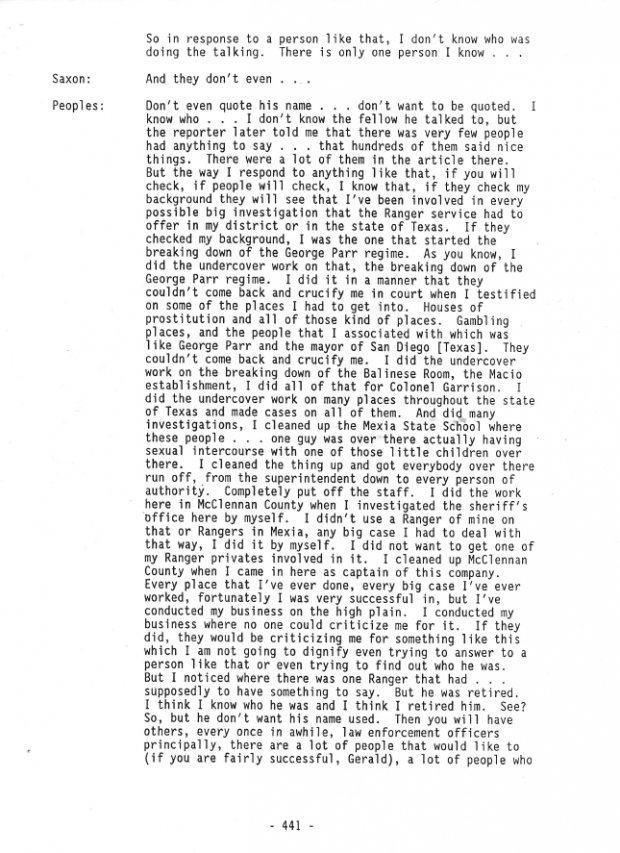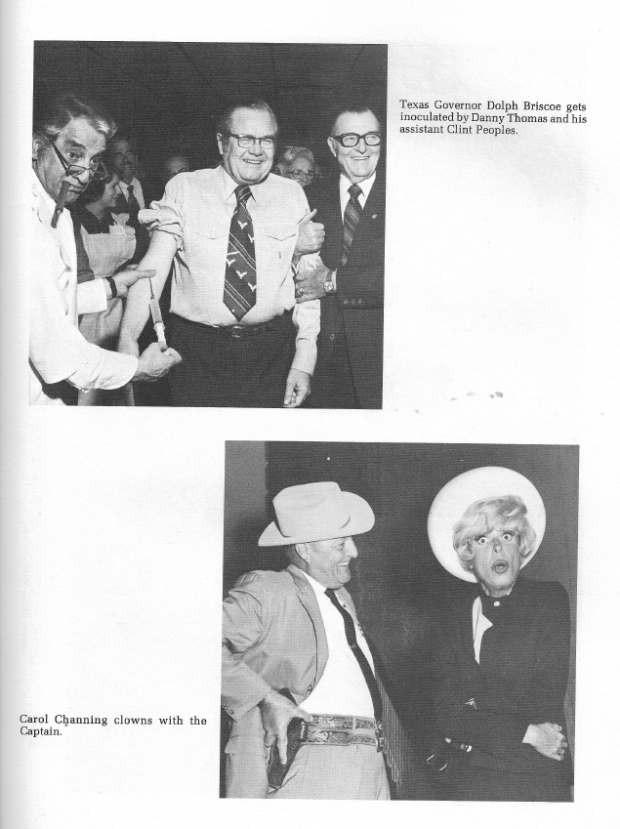On August 15, 1989, four and one-half years after his original 1984 interviews with Gerald Saxton for the Dallas Public Library, Peoples sat down with Saxon again, as well as Cindy Smolovik, to review and update his earlier statements. These pages were appended to his earlier oral history such that the eleven pages below were numbered according to the previous sequence and are the final pages that were withheld from the public until 2012.
Clint Peoples began his law enforcement career as a deputy sheriff in Conroe, Texas in 1930. In 1941 he joined the Texas Department of Public Safety as a highway patrolman, moved to the Texas Rangers in 1946 and finally became a U.S. Marshal in 1974. After 59 years in law enforcement, he retired in 1989, and a lengthy article commemorating that occasion appeared in the Fort Worth Star-Telegram on June 11th of that year (a copy of which has been reproduced on page 2).
 Who REALLY Killed Mart...
Best Price: $17.34
Buy New $15.43
(as of 10:02 UTC - Details)
Who REALLY Killed Mart...
Best Price: $17.34
Buy New $15.43
(as of 10:02 UTC - Details)
Of the numerous cases he handled throughout his career, he stated in the first paragraphs of this interview that “clearing the Henry Marshall case is the most rewarding thing that I ever did . . .” This was despite the fact that, by that time, the three men responsible for that homicide (Lyndon Johnson, Cliff Carter and Malcolm “Mac” Wallace) were all deceased, and nothing further could be done to bring final, albeit delayed “justice,” to the case.
It is possibly the fact that the correction of Henry Marshall’s cause of death (for 23 years it had, outrageously, been classified as a “suicide” — impeding the needed investigation, and justice for the victim and his family) finally enabled others (i.e., “us”) to correct the rest of the historical record that caused him to call that case his single most rewarding one. Unfortunately, the famed journalists, historians and biographers who have covered Lyndon B. Johnson — the dominate member of the above trio — have so far ignored that miscarriage of justice in their quest to cover up his many treacheries, treasons and assorted miscellaneous crimes.
In 1980 — four years before his “most rewarding” accomplishment — James M. Day published a biography of Captain Peoples, which included references to the many awards he had received in the 1960-70s, and some of the celebrity events in which he had participated, over an unblemished lifetime of law enforcement.
Clint Peoples’ eventual fame was due to his impeccable credentials; his reputation came about not because he had promoted himself as his accusers had inferred, but because of his integrity and perseverance. The fact that he merely responded to others who solicited him for those projects is reflected in the proposed titles which they came up with: Three of the four proposals had the term “Quiet Man” (or a similar derivative).
As a consequence of his growing fame, during the 1984-1988 period a number of proposals for movies and a “mini-series” on television were sent to Peoples, all based upon his role in the Henry Marshall murder investigation. Up to four different projects had been started, then suspended for unknown but obvious reasons. Among the titles for these works were The Quiet Man; The Legend of the Quiet Man; Quiet Power: The Making of a Lawman; and finally, LBJ, Accessory to Murder. Letters found in the Clint Peoples collection at the Dallas Public Library outline these proposals, though none of them ever progressed to final consummation. (Five of those documents were presented in Appendix A of LBJ: From Mastermind to The Colossus). One of these letters stated the producer’s intent to get started on this after the settlement of the writer’s strike then in progress. Moreover, it indicated that the would-be producer wanted to proceed “with great vigor” toward making a four-hour television miniseries.
I contacted that producer, Diane Walsh, to determine the reason(s) the proposal was apparently dropped, as if it were a “hot potato.” She told me that she had left her position at that company shortly after that exchange of
correspondence and did not know how it was resolved. Another long-term employee of that production company informed me that neither he, nor anyone else who had been employed there at that time remembered any of these initiatives. The fact that all of the correspondence stopped after these proposal letters, with nothing further in the file to indicate the reason it was dropped, leaves open the reasonable conclusion that the project was discontinued because a third party’s determined effort to make it stop. It is noteworthy, and probably dispositive of the enigma, that during this time period, Jack Valenti was playing his role as “Mr. Hollywood” just as Lyndon Johnson had cast him for, with the help of his friend Lew Wasserman. And his primary objective, as set by Johnson, was to keep the LBJ reputation consistent with the myths being wrought, not the awful truths of his real “legacy.” Therefore, it should be considered a foregone conclusion that Valenti was behind the suppression of those projects, just as he shared the same role with Bill Moyers in getting Episodes 7 – 9 of the History Channel’s series The Men Who Killed Kennedy taken down from future broadcasts, as previously described here.
 LBJ: The Mastermind of...
Best Price: $7.91
Buy New $11.23
(as of 06:30 UTC - Details)
However, there are many other indications that much of the material Peoples had collected and gifted to the Dallas Public Library is also missing. Based upon his previous other activities, it is most likely that Federal Judge Barefoot Sanders removed certain materials from the Peoples Collection. That is precisely what Clint feared the most, and it was the reason he decided to hold back the most provocative parts of his oral history which recorded his findings that would point directly to Lyndon Johnson’s criminal activities. The other pieces of direct physical evidence related to that testimony were among the missing items.
LBJ: The Mastermind of...
Best Price: $7.91
Buy New $11.23
(as of 06:30 UTC - Details)
However, there are many other indications that much of the material Peoples had collected and gifted to the Dallas Public Library is also missing. Based upon his previous other activities, it is most likely that Federal Judge Barefoot Sanders removed certain materials from the Peoples Collection. That is precisely what Clint feared the most, and it was the reason he decided to hold back the most provocative parts of his oral history which recorded his findings that would point directly to Lyndon Johnson’s criminal activities. The other pieces of direct physical evidence related to that testimony were among the missing items.
Peoples’ growing fame, illustrated in the photos following the interview pages below, caused some jealousy in the minds of certain fellow Rangers. Within the last two pages of the interview Peoples discusses how some of his colleagues became jealous of his fame and celebrated career.
In 2007, another author, Robert M. Utley, in his book Lone Star Lawmen: The Second Century of the Texas Rangers, portrayed Peoples in the same derisive manner. What the author left out, intentionally or not, was that his irrepressible pursuit of the Henry Marshall murder case, clearly aimed at exposing Lyndon Johnson’s criminality, also engendered a degree of hate among his peers, for reasons of jealousy or envy, or because they wanted to be politically correct and not make waves. They seemingly had “given up” any interest in finding the murderers of Henry Marshall, et. al., while wishing that the embarrassment of Peoples’ actions, in dogged pursuit of the murderers, would just “go away.” The fact that he spent twenty-three years in his dogged quest to solve the case might have put many of them to shame as well.
Note: To increase the type-size on the following pages, right-click on the page and select “Open image in new tab,” then open the new page.
See page 2 for the Fort Worth Star-Telegram article announcing his third and final retirement on June 11, 1989.
Reprinted with the author’s permission.
 Remember the Liberty!:...
Best Price: $12.75
Buy New $10.00
(as of 07:20 UTC - Details)
Remember the Liberty!:...
Best Price: $12.75
Buy New $10.00
(as of 07:20 UTC - Details)
 L.B.J: From Mastermind...
Best Price: $23.46
(as of 12:57 UTC - Details)
L.B.J: From Mastermind...
Best Price: $23.46
(as of 12:57 UTC - Details)


















